 According to recent news release from United States Bureau of Labor, twenty-five percent of all American workers are self-employed.
According to recent news release from United States Bureau of Labor, twenty-five percent of all American workers are self-employed.
That means one out of every four of us is our own boss, right?
Wrong.
Everybody is their own boss.
Even if you’re not self-employed.
Even if you’re not employed at all.
You’re still the boss.
Interestingly, the term “boss” comes from the Dutch baas, which means, “overseer.”
Isn’t that what you do everyday?
You oversee your decisions, your career and your self-talk.
You keep yourself going even when you don’t feel like pressing on.
You provide momentum, arouse perseverance and inspire stick-to-itiveness.
But, being your own boss isn’t just about productivity.
It’s about freedom.
It’s about ongoing self-care.
It’s about setting boundaries.
It’s about making smart decisions.
It’s about treating yourself as you wish to be treated.
THE PROBLEM IS: Most of us are sucky bosses.In a recent blog post, Seth Godin riffed on an idea that inspired me to rethink my own self-bossing practices:
“If you had a manager that talked to you the way you talked to you, you’d quit. If you had a boss that wasted as much as your time as you do, they’d fire her. And if an organization developed its employees as poorly as you are developing yourself, it would soon go under.”
If that describes you, consider the following strategies for becoming a better boss to yourself:
1. Declare a moratorium on the unimportant. Have you ever worked for a boss who, on a daily basis, invaded your workspace unannounced and talked your ear off for three hours about absolute meaninglessness – when you could have been executing something that mattered – then later yelled at you for not being productive?
The amount of time wasted on such stupidity could fill the Superdome.
Your challenge, as the boss of yourself, is to assure that interruption doesn’t dominate you. If what you’re doing – right now – isn’t consistent with your number one goal, politely walk away. If what you’re doing – right now – doesn’t matter, peace out.
Next time you look up and realize that you’ve been purposely distracting yourself for the past twelve minutes, pause for a moment, then gently return to the work that counts. What’s your philosophy on personal productivity?
2. Stop saying it’s not about you. Doing so invalidates yourself. Besides, part of being a better boss to yourself is being more selfish with yourself. For example: Are you whining about the failing economy – or focusing on your economy?
Hopefully the latter, because your economy is how you manage yourself in relation to the world. In fact, the definition of economy is, “The disposition or regulation of the parts and functions of any organic whole.”
Maybe it’s time to start asking yourself a few boundary questions:
*Is this an opportunity, or an opportunity to be used?
*Who in my life is chronic abuser of my time and attention?
*Am I being asked to create a future that I’m going to feel obligated to be a part of?
Remember: It can’t be about you all time – but it can’t be about you none of the time either. Are you ready to hold a courageous conversation to reinforce your boundaries?
3. A diploma isn’t the end of education. A good boss wouldn’t let you get away with that kind of thinking. Instead, she’d challenge you create a learning plan. To expand your expertise. To form opinions on relevant issues. And to build a school of thought around your unique philosophy.
Besides: When you stop learning – you stop earning. You stop living. And you stop growing. Not exactly the best employee, huh? Consider asking yourself: What’s your personal development gameplan? What’s your method to sustain lifelong education? And what’s your system for retaining relevance in the eyes of the people who matter most?
These are the questions that will help you create an environment where learning is stressed and build a space where you can assimilate, internalize, master and move on. What are the obstacles you create that hinder a full engagement with your learning?
4. Detect the collective conditioning inside yourself. Ten years ago, I told my parents that I wanted to wear a nametag. Everyday. For the rest of my life. Sure enough, they responded with a four-letter word. But it wasn’t the one I expected. Instead of saying, “What?” “Crap!” or “Putz,” they just smiled and replied, “Cool.”
And I never looked back.
I wonder what would happen if more people had bosses like that. I wonder how much positive change could be created in the world if people practiced healthier self-talk. Especially when it came to the issue of risk.
Because in my experience, if you don’t honor yourself for the bravery of taking risks, the paralyzing self-consciousness negates your developmental progress. And your annual performance review will be a joke. Except you won’t be laughing. Because you’ll be both the boss and the employee.
Remember: The biggest risk is the one you don’t give yourself permission to take. Think about the last time you said, “Screw it – I’m doing it anyway,” how did you feel afterward?
5. Raise hell against redundancy. Recently, my friend Amy told me she’d rewritten her fifty-five page book proposal two-dozen times. Two. Dozen. Times. That’s over than thirteen hundred pages. Of just the proposal – not the actual book.
Seriously? War & Peace wasn’t even that long. And the sad part is: She wasn’t even done yet. “I’m still ironing out the wrinkles,” she said.
Tragic. With the time Amy invested in that project, she could have written and shipped six real books. If only she’d known that finished is the new perfect. If only she’d known that planning is the gateway drug to procrastination.
You think her crime of redundancy would survive in a traditional boss situation? Hell no. Somebody would either get fired or quit.
Lesson learned: Next time you find yourself stuck on the treadmill of the inconsequential, consider the possibility that what’s consuming your time (a) makes no sense, (b) doesn’t need to be done by anyone, and (c) isn’t making you any money. How many built-in redundancies could you eliminate?
6. Maintain your motivational equilibrium. As the boss of you, self-motivation is the lifeblood of your success. Without it, getting out of bed will become a chore rather than a celebration.
The tricky part is: Nobody’s ass is harder to kick than your own. Anyone who’s ever gone out on their own or worked from home can attest to that. Fortunately, everybody has the capacity for self-motivation.
The challenge is twofold: First, remembering that energy follows priority. Because if you’re not doing it, it’s not important to you. Period. But if you know what matters, you’ll be able to motivate yourself anytime, anywhere.
Second, becoming a master of your own disinclination. Allowing discipline to trump desire. And learning to love what’s good for you and your career. What would it take for you to wake up excited tomorrow?
REMEMBER: Being your own boss demands unremitting effort.
And with increasing levels of self-employment, newfound entrepreneurship, mobile offices and global telecommuting, self-care has never been more essential.
But it’s part of your job.
It’s part of everybody’s job.
Even if you don’t have a job.
You are overseer.
Treat yourself as you wish to be treated.
LET ME ASK YA THIS…
Do you need to fire yourself?
LET ME SUGGEST THIS…
For the list called, “194 Books in Scott’s Success Library,” send an email to me, and you win the list for free!
* * * *
Scott Ginsberg
That Guy with the Nametag
Author, Speaker, Entrepreneur, Mentor
[email protected]
 Never the same speech twice.
Never the same speech twice.
Now booking for 2011!
Watch The Nametag Guy in action here!
 In baseball, just over a hundred players hit a homerun on their first at bat.
In baseball, just over a hundred players hit a homerun on their first at bat.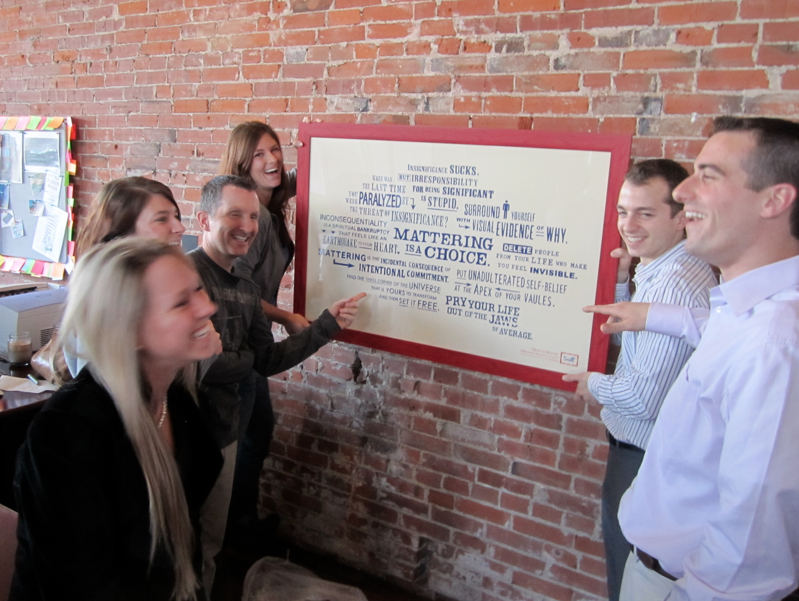 My job is to help companies make their mission more than a statement, using limited edition social artifacts.
My job is to help companies make their mission more than a statement, using limited edition social artifacts.

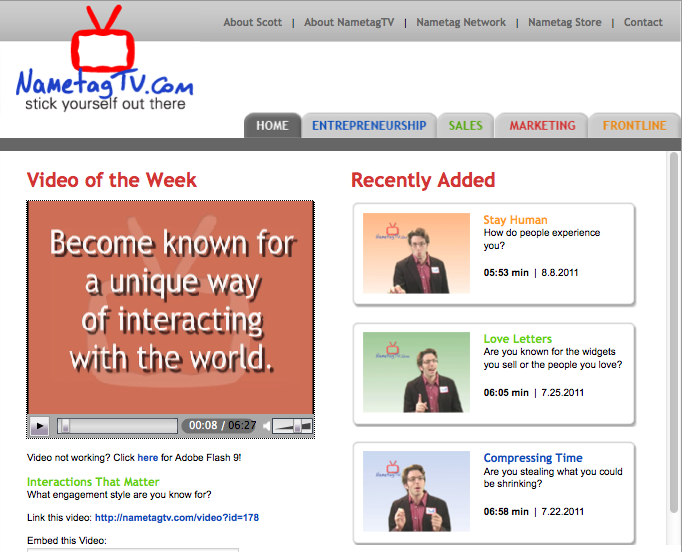 How boring is your company’s online training?
How boring is your company’s online training?
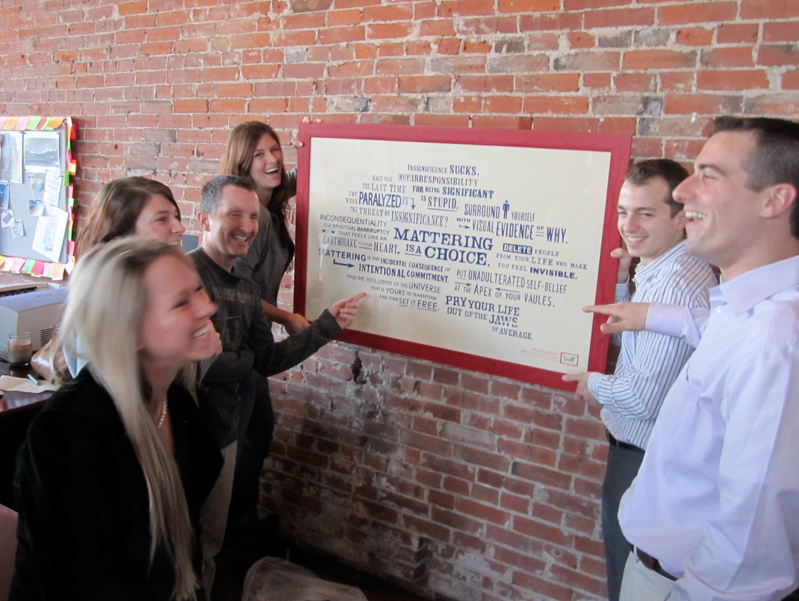 My job is to help companies make their mission more than a statement, using limited edition social artifacts.
My job is to help companies make their mission more than a statement, using limited edition social artifacts. The hard part about hiring yourself is, every paycheck is
The hard part about hiring yourself is, every paycheck is Scott has written and published over 1,000,000 words.
Scott has written and published over 1,000,000 words. The hard part about working alone is the lack of
The hard part about working alone is the lack of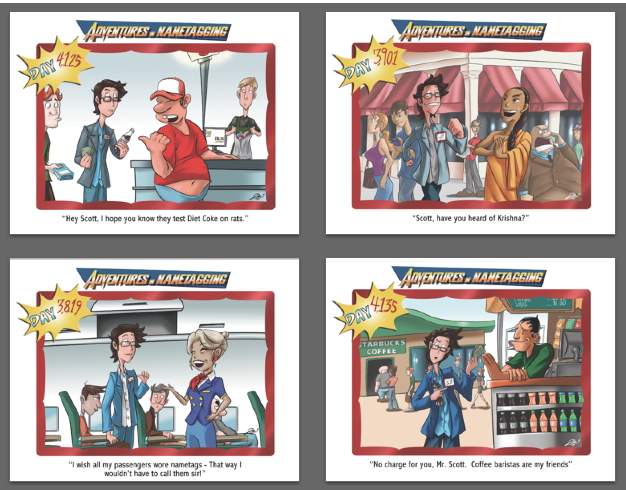
 Tom Petty said that waiting is the hardest part.
Tom Petty said that waiting is the hardest part. Do you need an expert who tells you what to do, or a mentor who lets you tell yourself what to do?
Do you need an expert who tells you what to do, or a mentor who lets you tell yourself what to do? Turn on the television for five minutes, and you’ll observe the barrage of
Turn on the television for five minutes, and you’ll observe the barrage of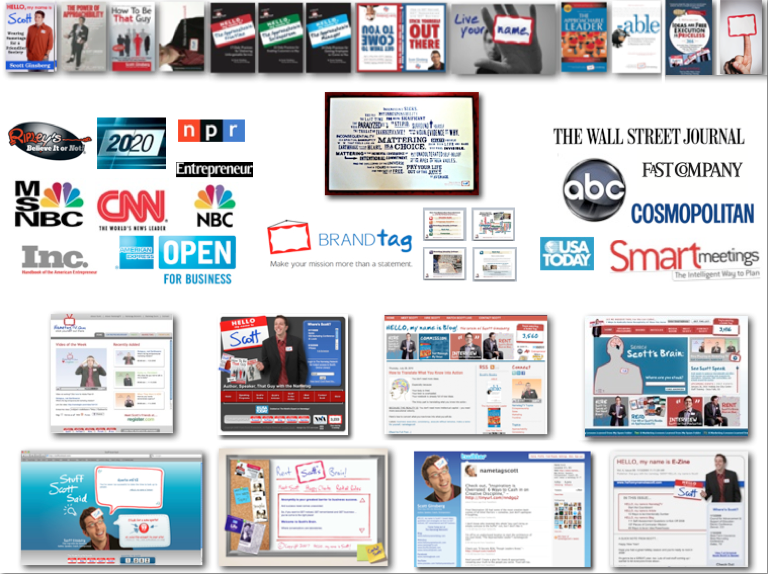 Yes, I do more than just wear a nametag all day.
Yes, I do more than just wear a nametag all day.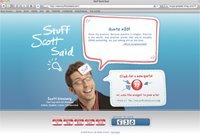 Who’s quoting YOU?
Who’s quoting YOU? Everyone is old to someone.
Everyone is old to someone. Who’s quoting YOU?
Who’s quoting YOU? According to recent news release from United States Bureau of Labor, twenty-five percent of all American workers are self-employed.
According to recent news release from United States Bureau of Labor, twenty-five percent of all American workers are self-employed.